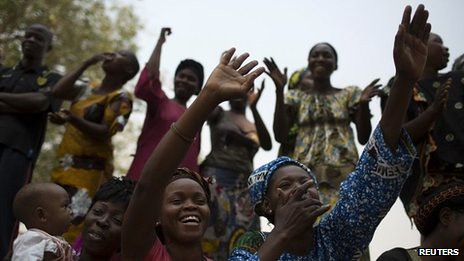
Central African Republic residents cheer interim leader Alexandre-Ferdinand Nguendet. The new leader has vowed a security crackdown on violence., a photo by Pan-African News Wire File Photos on Flickr.
15 January 2014
Last updated at 07:11 ET
UN stresses Central African Republic disaster warning
A senior UN envoy has called for a huge international effort for the Central African Republic.
Speaking to the BBC in the capital, Bangui, John Ging of the UN Office for the Co-ordination of Humanitarian Affairs (OCHA) said the country was in a "mega-crisis".
Mr Ging said that many in the population were living in fear because of religious and ethnic attacks.
He said the concern now was that matters could worsen further.
Last week the UN warned that the country faced disaster because of people fleeing the conflict to pack into overcrowded camps with poor sanitation.
It said that measles had broken out at the airport in the capital, Bangui, where about 100,000 people are seeking refuge from clashes between rival militias.
'Huge international effort'
Mr Ging said that "massive displacement" in the CAR had meant that almost a million people had left their homes throughout the country.
"And with that displacement, of course, you have all the humanitarian needs: shelter, food, medical care and so on. Our great fear is that it will deteriorate and spiral out of control. Although for a million people it's already out of control."
He called for a huge international effort to tackle the situation.
"Everything has been lost," he said. "Homes have been destroyed, facilities, schools and medical centres completely ransacked and destroyed [along with] water wells."
He said that the "wanton destruction was hard to conceive" and there was "a huge task ahead for the whole community... both domestically and internationally to help the people of this country to rebuild their lives".
Mr Ging said the situation for people outside the capital, Bangui, was even worse, because they are geographically isolated and it was harder to get the assistance to them.
"[For some] the options are stark: stay in the jungle and die or come back and possibly be killed," he said.
Foreigners in CAR continue to be repatriated.
One of nearly 300 Malians who landed in Bamako on Thursday told the BBC of his relief to be out of the country.
"It's hard to know how to put it, except now we are in paradise. Over there it is hell," Mamadou Ndiaye said.
"They smashed up our house and shop.
They are at the airport so we Muslims cannot go there, for fear of being chopped up. And the Christians cannot come into our neighbourhood, the one known as the Senegalese quarter," the 25-year-old said.
Mali's government brought back 500 people last week and with further flights organised by the International Organisation for Migration, the number of Malian returnees is expected to be more than 1,000.
Following a UN investigation into the conflict on Tuesday, which found widespread sectarian killings of civilians and sexual violence, UN human rights chief Navi Pillay warned that massive violations could recur without further significant international invention.
More than 1,000 people have died in sectarian violence, which erupted when Seleka rebels seized power in March last year and Michel Djotodia became the country's first Muslim leader.
Although he disbanded his Seleka, they continued to attack Christian civilians, prompting the formation of vigilante groups, which targeted Muslims.
Mr Djotodia stepped down last Friday under intense pressure from CAR's neighbours. A special session of parliament has convened to elect a new interim leader for the landlocked country of 4.6 million people.
Sporadic violence has continued, despite the presence of 1,600 French troops and 4,000 African Union peacekeepers.
No comments:
Post a Comment